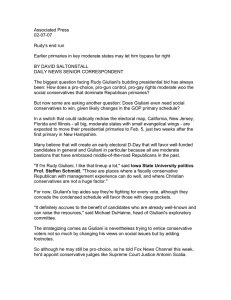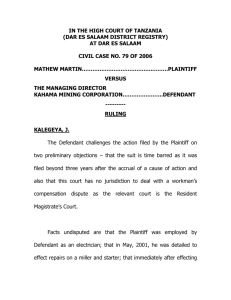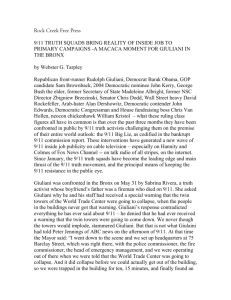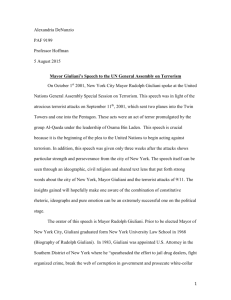The Grammatical Lawyer
advertisement
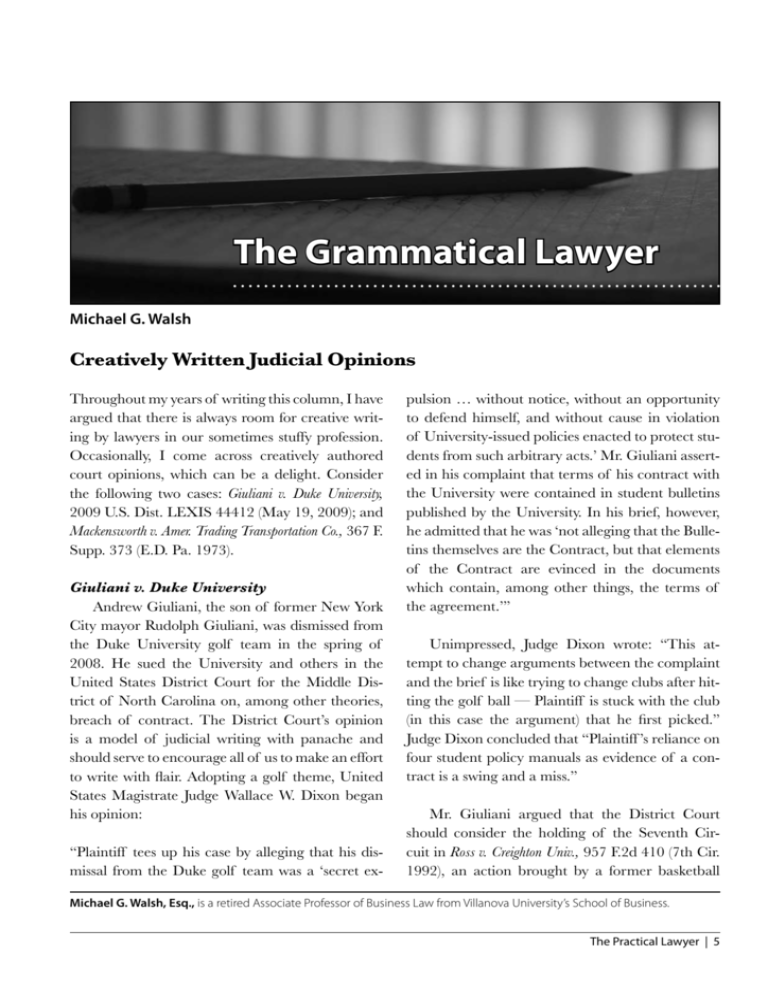
The Grammatical Lawyer Michael G. Walsh Creatively Written Judicial Opinions Throughout my years of writing this column, I have argued that there is always room for creative writ‑ ing by lawyers in our sometimes stuffy profession. Occasionally, I come across creatively authored court opinions, which can be a delight. Consider the following two cases: Giuliani v. Duke University, 2009 U.S. Dist. LEXIS 44412 (May 19, 2009); and Mackensworth v. Amer. Trading Transportation Co., 367 F. Supp. 373 (E.D. Pa. 1973). Giuliani v. Duke University Andrew Giuliani, the son of former New York City mayor Rudolph Giuliani, was dismissed from the Duke University golf team in the spring of 2008. He sued the University and others in the United States District Court for the Middle Dis‑ trict of North Carolina on, among other theories, breach of contract. The District Court’s opinion is a model of judicial writing with panache and should serve to encourage all of us to make an effort to write with flair. Adopting a golf theme, United States Magistrate Judge Wallace W. Dixon began his opinion: “Plaintiff tees up his case by alleging that his dis‑ missal from the Duke golf team was a ‘secret ex‑ pulsion … without notice, without an opportunity to defend himself, and without cause in violation of University‑issued policies enacted to protect stu‑ dents from such arbitrary acts.’ Mr. Giuliani assert‑ ed in his complaint that terms of his contract with the University were contained in student bulletins published by the University. In his brief, however, he admitted that he was ‘not alleging that the Bulle‑ tins themselves are the Contract, but that elements of the Contract are evinced in the documents which contain, among other things, the terms of the agreement.’” Unimpressed, Judge Dixon wrote: “This at‑ tempt to change arguments between the complaint and the brief is like trying to change clubs after hit‑ ting the golf ball — Plaintiff is stuck with the club (in this case the argument) that he first picked.” Judge Dixon concluded that “Plaintiff ’s reliance on four student policy manuals as evidence of a con‑ tract is a swing and a miss.” Mr. Giuliani argued that the District Court should consider the holding of the Seventh Cir‑ cuit in Ross v. Creighton Univ., 957 F.2d 410 (7th Cir. 1992), an action brought by a former basketball Michael G. Walsh, Esq., is a retired Associate Professor of Business Law from Villanova University’s School of Business. The Practical Lawyer | 5 6 | The Practical Lawyer player who alleged that he had been academically unprepared for a college curriculum when he was recruited by Creighton and took away little or noth‑ ing from his years in the classroom. Judge Dixon disagreed: “Ross serves as a putter, however, where Plaintiff needs a sand wedge to get out of the haz‑ ard.” The District Court threw out the breach of contract claim. Judge Dixon then considered Mr. Giuliani’s allegation that Duke’s golf coach “intentionally, maliciously, fraudulently, and without justification induced the University to cease performance of the Contract.” After reviewing the complaint and the underlying facts, Judge Dixon concluded: “Plain‑ tiff also shanks this claim.” (Note to nongolfers: a shank is a shot that results when the ball lodges be‑ tween the neck of the iron and the blade during the player’s swing, resulting in the ball’s going dramati‑ cally off-line, sometimes at nearly a right angle to the intended line of flight.) Mr. Giuliani also raised a promissory estop‑ pel claim but did not argue it in his brief. Judge Dixon responded that this claim brings to mind Carl Spackler’s analysis from the movie Caddyshack (Orion Pictures 1980): “‘He’s on his final hole. He’s about 455 yards away, he’s gonna hit about a 2 iron, I think.’ North Carolina does not recognize affir‑ mative claims of promissory estoppel; thus, Defen‑ dants are entitled to a judgment on the pleadings.” (An average golfer cannot hit a two iron much far‑ ther than 180 yards or so.) Slow play is the bane of golfers who increas‑ ingly spend five or six hours for a round of golf. On the professional golf tour, officials sometimes put a slow-playing group “on the clock,” requiring the players to hit a shot within so many seconds of tak‑ ing their stance or risk a one-stroke penalty. Judge Dixon used this concept to deal a final, fatal blow to Mr. Giuliani’s promissory estoppel theory: “Plain‑ tiff tries to get around the slow play of his promis‑ sory estoppel claim by arguing that he should re‑ cover on a quasi or implied contract theory. … [T] October 2009 his court must apply the consistent North Carolina precedents … that policy manuals are non‑bind‑ ing.” Mr. Giuliani’s last claim suffered the same fate: “Plaintiff ’s fifth and final claim for declaratory judg‑ ment, which was also not argued in his brief, can be disposed of with a hole‑in‑one sentence: no valid contract means no declaratory judgment.” Judge Dixon concluded by granting the motions for judg‑ ment on the pleadings by the defendant University and others. As much as I enjoyed Judge Dixon’s novel ap‑ proach of using golf analogies, I see two possible problems: (1) readers unfamiliar with the game may find the expressions misleading or annoying; and (2) the losing party can be excused if he feels that the Judge treated his lawsuit flippantly, showing no consideration to the expense and effort involved his case. Mackensworth v. Amer. Trading Transportation Co. I discovered this admiralty opinion when I was in law school. It is the most unusual and enter‑ taining case I ever read. District Judge Edward R. Becker wrote: The motion now before us has stirred up a terrible fuss. And what is considerably worse, it has spawned some preposterous doggerel verse. The plaintiff, a man of the sea, after paying his lawyer a fee, filed a complaint of several pages to recover statutory wages. The pleaded facts remind us of a tale that is end‑ less. The Grammatical Lawyer | 7 A seaman whom for centuries the law has called “friendless” The moral: Better personally served than be sorry.” is discharged from the ship before voyage’s end and sues for lost wages, his finances to mend. Not to be outdone, the defense took the time to reply with their own clever rhyme. The defendant shipping company’s office is based in New York City, and to get right down to the nitty gritty, The defense counsel team of Mahoney, Roberts, & Smith drafted a poem cutting right to the pith: it has been brought to this Court by long arm ser‑ vice, which has made it extremely nervous. “Admiralty lawyers like Harry both current and those known from lore Long arm service is a procedural tool founded upon a “doing business” rule. But defendant has no office here, and says it has no mania to do any business in Pennsylvania. Plaintiff found defendant had a ship here in June ’72, but defendant says that ship’s business is through. Asserting that process is amiss, it has filed a motion to dismiss. Plaintiff ’s counsel, whose name is Harry Lore, read defendant’s brief and found it a bore. Instead of a reply brief, he acted pretty quick and responded with a clever limerick: “Admiralty process is hoary With pleadings that tell a sad story Of Libels in Rem — The bane of sea‑faring men. be they straight types, mixed or fairy Must learn how to sidestep our bore. For Smith, not known for his mirth with his knife out for Mackensworth With Writs, papers or Motions to Quash Knows that dear Harry’s position don’t wash.” Overwhelmed by this outburst of pure creativity, we determined to show an equal proclivity. Hence this opinion in the form of verse, even if not of the calibre of Saint‑John Perse. The first question is whether, under the facts, defendant has done business here to come under Pennsylvania’s long arm acts. If we find that it has, we must reach question two, whether that act so applied is constitutional un‑ der Washington v. International Shoe. Defendant runs a ship known as the SS Washington Trader, whose travels plaintiff tracked as GM is said to have followed Nader.


